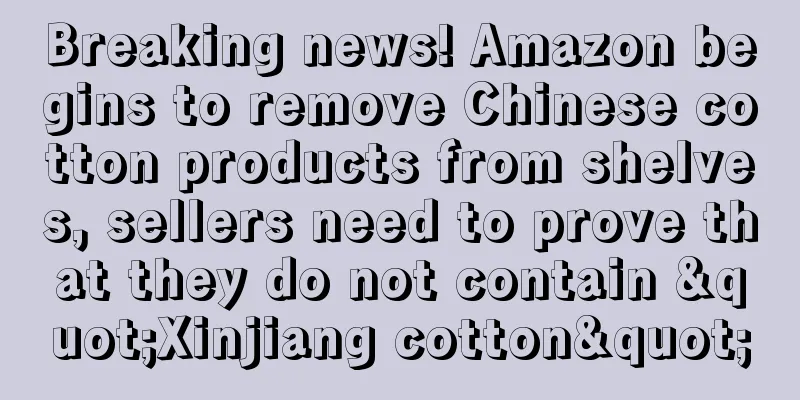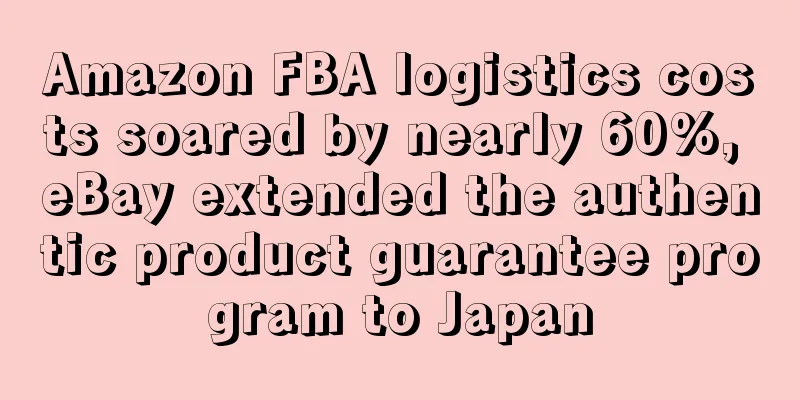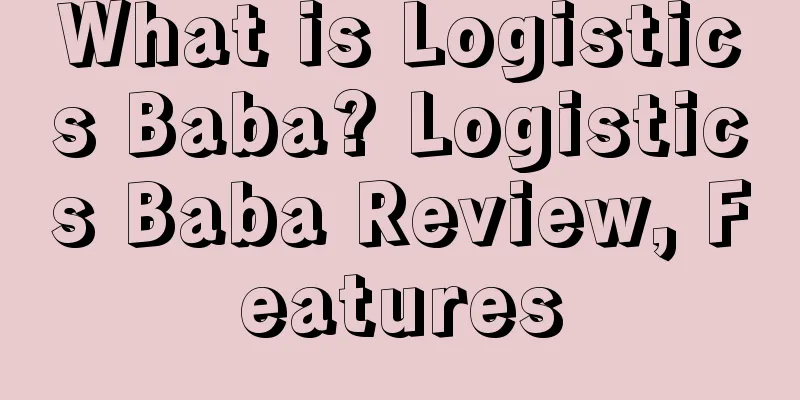Breaking news! Amazon begins to remove Chinese cotton products from shelves, sellers need to prove that they do not contain "Xinjiang cotton"

|
This week, H&M was strongly boycotted by the public for a statement that it would stop using Xinjiang cotton. Subsequently, Adidas, Uniqlo, Puma and other brands were announced to terminate their cooperation by celebrity spokespersons, which was very impressive. Cross-border people who were shouting "support domestic products" could never have imagined that this fire would spread to their own circle so quickly.
According to feedback from sellers, Amazon removed its products because they contained "cotton produced in Xinjiang", and the US platform Wayfair also sent emails to remind sellers that products from Xinjiang may be seized and confiscated; in addition, the US Customs and Border Protection issued a directive banning the import of all cotton products from Xinjiang, and some freight forwarders have refused to accept products containing cotton.
Amazon removes products from sale because they contain "Xinjiang cotton"
On the 25th, a seller posted an Amazon email with shocking content:
The email notified the seller that the relevant bath towel product detail page had been removed from the catalog, and stated, "This product has been removed in accordance with U.S. law regarding products containing cotton or tomatoes from Xinjiang. Why did this happen? We took this action because the product is not allowed to be sold on Amazon.com."
Some sellers speculated that perhaps the above sellers marked keywords such as "Xinjiang long-staple cotton" in the raw material ingredients . Just when everyone was puzzled, another seller said that 50 of his products, including pillows, had just been removed from the shelves. The products were not pure cotton but just contained cotton. The email said that his products did not comply with US laws, but did not specify what laws.
"I need to ask the customer service for the reason. It should be a system error." The seller said. But the result of the communication with the customer service made him feel depressed: "The customer service asked me to prove that my pillow does not contain Xinjiang cotton and to provide proof, purchase invoices, etc. I told the customer service that the title does not contain Xinjiang cotton and the system has mistakenly killed it. The customer service said that she did not have the authority to change it and that I had to submit proof, otherwise it could not be processed."
"This will be a new storm, and we don't know how long it will last." He sighed.
There are more and more similar news. A seller said that as long as the word "Xinjiang cotton" appears in the copy, it will be directly removed from the shelves after being detected by the system, and it is said that they sell illegal products; an Amazon customer service representative of a cross-border e-commerce company said that the company did have a lot of cotton swabs and other products removed from the shelves, and he didn't know if it was related.
In addition, some sellers noticed that many cotton products were previously on sale on Amazon, including Li Ning products, but yesterday afternoon, Li Ning clothing and T-shirts were no longer searchable. The editor searched for "LI-NING" on Amazon, and only 48 search results were displayed. Except for a few pairs of shoes, the rest were badminton rackets and other sports goods.
At present, most sellers of cotton products can still sell normally. " Many of our company's stores selling pure cotton bedding are doing well and have not taken them off the shelves yet ." "Those selling women's clothing have not taken them off the shelves yet."
Despite this, textile sellers have been silent: "Will textile products such as polyester be involved? I have products labeled cotton, polyester-cotton, etc. Some of them have cotton in their names, but they are actually chemical fibers. Now I dare not change them for fear of causing trouble." "This year, a large number of goods contain cotton, which is really a disaster."
If Amazon really starts dealing with Chinese cotton products, many sellers will face a disaster. Home textiles and clothing will be the first to be affected, and shoes, clothing, luggage, etc. will also be difficult to stay out of it.
A foreign trade expert analyzed that Xinjiang cotton is mainly consumed domestically, but what is consumed domestically is the textile industry, and the final products of the textile industry are nothing more than shoes, clothing, and bags. From the beginning, this has been a chess move by the United States to target the huge trade deficit, and foreign trade people are destined to take sides. Amazon has started, and it is estimated that other platforms will follow suit.
People in the industry were anxious that business was difficult, and the news spread quickly after it got out of the circle, with #Amazon# becoming a hot topic.
Is it true or false that Amazon has removed all Chinese cotton products from its shelves?
The seller sighed: "It has become popular again, and the trending search has reached No. 17. As a cross-border e-commerce practitioner, I feel like a storm is coming."
The whistleblower complained in the first screenshot: "On Amazon, the United States has banned all Chinese cotton products, yes all." He also attached the screenshot of the seller's email mentioned above and the notice from the US Customs banning the import of all cotton products from Xinjiang. Netizens were extremely angry.
In fact, it is easy for sellers to see that the email may come from Amazon, but the import ban notice comes from the freight forwarder. However, more Chinese people are not clear about this and only know that Amazon is clearing out Chinese cotton products. So is it true that Amazon has removed Xinjiang cotton products from its shelves and banned them from sale? There are different opinions:
——"Not true, I asked the manager." ——"My friend who works at Amazon said it's true."
Amazon staff responded: We have not received any information, please refer to the official channels for information. But what is certain is that this is not groundless.
Some sellers found relevant supply chain standards in Amazon's backend, which prohibit Amazon stores from selling products that mention " are produced using forced labor, indentured labor, or child labor, including products identified as such by the U.S. Customs and Border Protection or any other relevant agency ":
If Amazon has reason to suspect that certain products do not meet its supply chain standards, it may require the seller to take a series of actions.
A seller analyzed the current situation: The U.S. Congress enacted the Uyghur Forced Labor Prevention Act last year. In theory, all U.S. companies will respond. Although some companies seem to be lobbying the U.S. Congress to amend the bill, they are temporarily delaying issuing a statement. However, this kind of political bill with an obvious targeted orientation is unlikely to be changed in the short term. Therefore, it is highly likely that Amazon will also issue a statement.
The seller suggested that if sellers of related products have great concerns, they can delete sensitive words in batches in advance, or replace them with cot*on; if they want to wait and see how things develop, it is recommended to keep a close eye on the listings and prepare batch templates in advance. If you find that the products are forced to be removed from the shelves, upload and update the templates as soon as possible.
In addition to Amazon, Wayfair, an American home furnishing e-commerce platform , also notified sellers of the incident. Last September, the platform sent an email to sellers:
The email informed the seller that “ as highlighted in a recent U.S. State Department report, U.S. Customs and Border Protection ( CBP) will refuse to import goods from the Xinjiang region that were produced using forced, indentured, or other labor methods. This may result in the seizure and confiscation of goods, and may even result in civil penalties against importers. ”
The actions of these platforms are ultimately driven by U.S. policies.
US Customs bans import of Xinjiang cotton products, freight forwarders refuse to accept goods containing cotton
Last September, officials from the U.S. Customs and Border Protection said that the United States would take measures to ban the import of cotton and tomato products from China's western Xinjiang region; in December last year, the U.S. Customs and Border Protection issued an order that the United States would detain some cotton and cotton products from Xinjiang and prohibit the entry of the goods.
Recently, after H&M, Adidas, Nike, New Balance and other companies issued statements to "stop using Xinjiang cotton", the incident attracted the attention of a large number of domestic people and continues to ferment to this day.
Recently, many sellers received the following notice from freight forwarders:
The U.S. Customs and Border Protection recently issued a directive prohibiting the import of all cotton products from China's Xinjiang Uyghur Autonomous Region. Any cotton-containing ingredients imported from China may be detained, and the release of detained goods requires proof that the goods do not contain cotton from the region. Currently, there is a requirement to submit 6 types of documents for each shipment, including a certificate of origin, the seller's self-certification that the exported product does not contain cotton from the region, and purchase orders and invoices for cotton raw silk, cotton thread, and cotton cloth.
(Full Notice)
The export conditions are very strict. Some foreign trade merchants said that in the European and American markets, many goods have arrived at the port, but if they cannot provide traceability documents for non-Xinjiang cotton, they will not be allowed to clear customs; a merchant said that since yesterday, they have received feedback from customers that customs clearance of textiles and even other goods exported to Europe has encountered problems, and customs clearance cannot be completed or even returned directly.
A foreign trader was very frustrated: "Recently, a batch of towels sent to the United States were detained. The logistics company told us that all textiles from China would be detained and not allowed to enter the country. We had to submit a list of ingredients and provide the origin of the raw materials. If they contained cotton, they would be returned or destroyed. A customer sold towels and textiles on Amazon, but they were removed from the shelves because they were made in China and were marked 'MADE IN CHINA'."
Exporting cotton-containing products is difficult, and some freight forwarders have stated that they "will not accept cotton-containing products." One seller said that his goods contained cotton and could not be shipped out because the freight forwarder would not accept them. Another seller felt very difficult: "I dare not ship goods today. Most of the products contain cotton. My freight forwarder received a notice that they will not accept Xinjiang cotton."
How many cross-border people will be caught up in this sudden storm? |
>>: Amazon Xinjiang cotton incident joint assistance plan online registration
Recommend
Base salary cut by 40%! Operations: No commission for a year
Prime Day is over, what will happen to the commis...
What is Translead Group INC? Review, Features
The Hengguangda Overseas Warehouse in the United S...
What is Renee Cosmetics? Renee Cosmetics Review, Features
Renee Cosmetics is an India-based DTC (direct to ...
36% of holiday shoppers plan to increase spending, highest level since 2018
Roku and Harris Poll recently surveyed 2,007 cons...
YouTube also joins the fray, live shopping is unstoppable
As live streaming has gained more and more attent...
Nearly 50% of Amazon consumers only add to cart but do not place an order
Advertising budgets have been spent, orders are f...
Continue to cultivate high-quality merchants and brands SHEIN's "Quality Products" overseas expansion plan is launched simultaneously
Recently, SHEIN's national 500-city industria...
New brand case! Don’t touch popular patterns
In addition to GBC, Keith Law Firm is also a freq...
AmazeOwl
AmazeOwl can help sellers solve problems such as w...
Alibaba's financial report released: International site becomes a highlight, GMV increased 25 times in the past 7 years
On February 20 , Alibaba released its latest quar...
With $14.1 billion in revenue and 31.2 million active customers, Wayfair leads the home furnishing market
In 2020, the epidemic changed consumer purchasing...
New progress in Amazon employee bribery case, two more people plead guilty
Compared with offline physical stores, cross-bord...
"Breaking out" from North America! Temu will be launched in Oceania and Europe
In the second week after its launch, the number o...
The seller has goods but cannot ship them! Even if you pay $3000 more, you may still not be able to get a container
Recently, almost all foreign trade people are fac...
Amazon's new policy will take effect next week, and sellers will be more interested in buying storage space
During the Spring Festival, Amazon officially ann...









